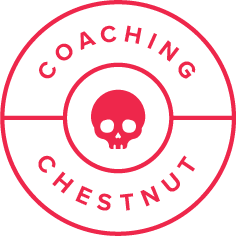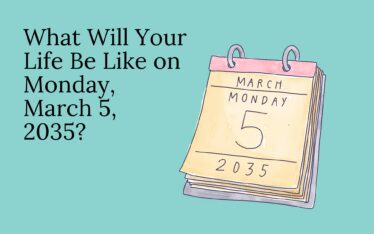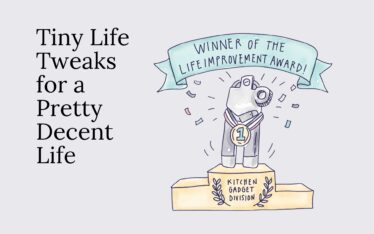Admit it — you got sucked in by the f-word.
Fear.
Dogs can smell it on you, and so can I. It’s not really hard to do — not much of a  parlor trick at all, really (bucket list item #340: come up with a parlor trick before I die). You don’t need to be a certified coach to know that we’re all riddled with fear and we’re all just doing our best to hide our insecurities from everyone around us, mostly including ourselves.
parlor trick at all, really (bucket list item #340: come up with a parlor trick before I die). You don’t need to be a certified coach to know that we’re all riddled with fear and we’re all just doing our best to hide our insecurities from everyone around us, mostly including ourselves.
I’m not going to talk about the usual suspects here today… our fears of failure, rejection, and spotty wifi. Let’s shake this fear shit up for a sec and approach it through the side door. Ready?
Ranking Your Worst Fears
Rank these items in order of what would be your worst nightmare… so #1 would be the worst possible thing, and #8 would be the least-horrible thing on the list:
- Going bankrupt
- Going 90% blind
- Your best friend turning against you
- Having a nervous breakdown
- Becoming half as mobile
- Being demoted at work
- Losing 15 I.Q. points
- Getting a scar across your face
How you answered is revelatory.
The things you fear the most shed light on what you value in your life — which can provide a helpful way to manage the choices you make (and don’t make) in life. See if any of the insights below happen to resonate, based on your #1 and #2 choices:
Going bankrupt: this fear might signal that you value security, competition, achievement, responsibility, the ability to be generous, or the perception of being successful… just to name a few. Fear of shame and judgment from others for “not having your shit together” or not driving a certain kind of car can cause us to strive harder and harder — operating from the land of lack instead of contentment with what we already have. (Life tip: when is enough, enough? Picture a dog chasing a car. Ever wonder what Bowser would do if he actually caught it? Is that you, chasing success to look a certain way on the outside so you can feel a certain way on the inside? To no real end?)
Going 90% blind: fearing blindness might indicate a value of independence, an appreciation for beauty, adventure, exploration, learning new and interesting things, or connecting with others eye to eye. Many of us fear we’ll miss out on our lives if we can’t see… if we age… if we step closer and closer to old age and death. (Life tip: that train is coming, so we’d might as well get mentally ready to board. Choo choo, friends.)
Your best friend turning against you: this fear might highlight your value of being accepted, belonging, love, intimacy, trust, and having special moments with another human being. Fear of betrayal and abandonment can lead us to withhold true friendship and commitment to people, lest we get hurt in the process. (Life tip: avoid hanging out with pre-teen girls. And continue to offer your love and friendship to others, regardless of having your feelings hurt in the past, because loneliness is more dangerous to your health than obesity.)
Having a nervous breakdown: this fear might reveal values of wanting serenity or peace, gaining control, feeling composed, and possibly valuing acceptance from others — whether you have a psychotic break or not. (Life tip: accept that no one is really all that sane, and go book an appointment with a therapist within the next 5 hours to ease this burden. You are allowed to struggle with mental health, but you’re not allowed to suffer in silence about it. That sounded bossy but I mean it.)
Becoming half as mobile: fearing immobility might mean you value health + fitness, the ability to remain independent and flexible, adventure, feeling in control, or not being seen as needy or old. This is the same as the blindness fear above, as it relates to fear of aging and withering on your vine, so to speak. (Life tip: imagine yourself needing a lot of help from others – from opening doors to pushing your wheelchair to maybe feeding you your oatmeal in the morning. What could be unexpectedly wonderful about all of those things? People with spinal cord injuries, for example, can be enormously resilient and describe themselves as happy.)
Being demoted at work: this fear shines the light on values like success, achievement, recognition, capability + competence, and acceptance. Many clients I’ve worked with have quit their jobs to avoid a demotion they knew was coming because they couldn’t bear the “did you hear what happened to Jane?” judgment from colleagues behind their backs. Other clients in similar situations stayed and proved themselves worthy of promotion again. Other demoted clients did a great job of not torching their boss’s cars after all. (Life tip: does your sense of self-worth feel tightly tied to your role/ title/ level at work? What might loosen that knot a bit for you, other than vodka? Career success is just one slice of the giant well-being pie.)
Losing 15 I.Q. points: fearing the loss of smarts might signal values like intelligence, having a strategic mindset, being respected, mentoring others, learning and personal development, critical thinking, creative problem solving, mastery, achievement, etc. If a little dumbing down has you gripped with fear, is it more about your own personal loss of intelligence, or what others might think of you if you lost your Mensa membership? (Life tip: many of the smartest cookies out there are also the unhappiest. Maybe ignorance is bliss after all?)
Getting a scar across your face: this fear doesn’t necessarily make you a narcissist. It likely indicates an appreciation of beauty, the value of having a strong presence, and maybe looking like you’re well put together (at least on the outside) in a society that nods in approval of very specific images. For many the idea of a facial scar sparks a wildfire of insecurity that’s rooted in vanity and perfectionism: “what will people think of a mangled version of me?” (Life tip: people are thinking more about themselves than you anyways — about 104% of the time — so you can take that trash talk in your head out… to the trash. Read more here about the “Overblown Implications Effect.” Also, where else are you beautiful, apart from your gnarly scarred face? Like on the inside — any good stuff in there at all? Likely you don’t need to dig deep for that inner beauty.)
Putting it all in perspective
You know what?
YOU’RE GOING TO DIE SOMEDAY. Maybe soon? Probably not, but maybe. Definitely someday.
If you knew you had 9 years left to live (for a bizarre example to hopefully illustrate my point), how much would fear rule the roost in those remaining years? How much would you care what people thought of your status at work or whether your face had an imperfection? Would it really matter if you needed a walker or if you’d flushed all your money down the toilet? Chances are you’d get down to the business of living your life on purpose, knowing how fast 9 years goes by.
The real question is whether you’re letting fear rule the roost of your life (i.e.: playing not to lose), or if you’re telling fear to fuck right off, please and thanks (i.e.: playing to win).
Abraham Maslow said, “To make the growth choice instead of the fear choice a dozen times a day is to move a dozen times a day towards self-actualisation.” SIGN US UP FOR SELF-ACTUALIZATION, ABE!
Fun fact about Abe: he had a personal brush with death through a near-fatal heart attack in 1957, and he wrote this of his experience:
“The confrontation with death–and the reprieve from it– makes everything look so precious, so sacred, so beautiful, that I feel more strongly than ever the impulse to love it, to embrace it, and to let myself be overwhelmed by it. My river never looked so beautiful… Death and its ever-present possibility makes love, passionate love, more possible. I wonder if we could love passionately, if ecstasy would be possible at all, if we knew we’d never die.”
There are countless ways we can let fear guide us, yet limited days and months and years to live. Let’s bury the fear choice deep in the ground (yes, in a cemetery), and make the growth choices that honor our values… a dozen times a day, every day we’re lucky to be alive. With scars and all.







